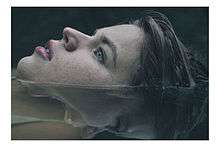Alter ego
An alter ego (Latin, "the other I") is a second self, which is believed to be distinct from a person's normal or original personality. A person who has an alter ego is said to lead a double life. The term appeared in common usage in the early 19th century when dissociative identity disorder was first described by psychologists.[1] Cicero first coined the term as part of his philosophical construct in 1st century Rome, but he described it as "a second self, a trusted friend".[2]

A distinct meaning of alter ego can be found in literary analysis, wherein it describes characters in different works who are psychologically similar, or a fictional character whose behavior, speech or thoughts intentionally represent those of the author. It's also used to designate the best friend of another character in a story. Similarly, the term alter ego may be applied to the role or persona taken on by an actor[3] or by other types of performers.
The existence of "another self" was first recognized in the 1730s. Anton Mesmer used hypnosis to separate the alter ego. These experiments showed a behavior pattern that was distinct from the personality of the individual when he was in the waking state compared to when he was under hypnosis. Another character had developed in the altered state of consciousness but in the same body.[4]
Alter ego is also used to refer to the different behaviors any person may display in certain situations. Related concepts include avatar, doppelgänger, impersonator, and dissociative identity disorder (DID).
In fiction

- The title characters in Robert Louis Stevenson's thriller Strange Case of Dr Jekyll and Mr Hyde represent an exploration of the concept that good and evil exist within one person, constantly at war.[5] Edward Hyde literally represents the doctor's other self, a psychopath who is unrestrained by the conventions of civilized society, and who shares a body with the doctor. The names "Jekyll and Hyde" have since become synonymous with a split personality or an alter ego that becomes capable of overpowering the original self.
- Norman Douglas in the late eighteen-nineties wrote a short story, The Familiar Spirit, about a man who became aware while drowning of a conformist second self – "the presence within him of this Spirit, his alter ego, which is bent on crushing his ambition".[6]
- In comic books, superheroes and their secret identities are often considered alter egos. The archetypal comic book hero, Superman, assumes the identity of the "mild-mannered" newspaper reporter Clark Kent in order to live among the citizens of Metropolis without arousing suspicion. The Incredible Hulk comic book series further complicates this theme, as Bruce Banner loses control to the Hyde-like Hulk whenever he becomes angry, yet also depends upon the Hulk's super powers in order to combat villains. Comic book-inspired alter egos can be seen in other forms of popular fiction, including television and movie adaptations of comic books, parodies of this genre, and unrelated fictions.
- The British Pop Group Steps are seen in their Alter Egos in the Music Video for one of their popular singles, Deeper Shade of Blue.
- In the Sonic The Hedgehog games, Sonic the Hedgehog has a rival who can be mostly referred as Sonic's Alter Ego look-a-like and is called Shadow the Hedgehog.
- In the Crash Bandicoot games, Crash Bandicoot has a Clone who can be referred as his Alter Ego look-a-like and is Called Fake Crash Bandicoot.
- In Legend of Spyro Dawn of the Dragon, Spyro the Dragon was seen with a dark form that can be referred as his Alter Ego.
See also
References
- ↑ Irving B. Weiner, Donald K. Freedheim (2003). Handbook of Psychology. John Wiley and Sons. p. 262. ISBN 0-471-17669-9.
- ↑ "Alter Ego". Collins English Dictionary - Complete and Unabridged 10th Edition. William Collins Sons & Co. Ltd. 2009. Retrieved 13 January 2013.
- ↑ Glenn Daniel Wilson (1991). Psychology and Performing Arts. Taylor & Francis. ISBN 90-265-1119-1.
- ↑ Pedersen, David (1994). Cameral Analysis: A Method of Treating the Psychoneuroses Using Hypnosis. London, U.K.: Routledge. p. 20. ISBN 0-415-10424-6.
- ↑ I. Ousby ed., The Cambridge Guide to Literature in English (Cambridge 1995) p. 263
- ↑ N. Douglas, Looking Back (London 1934) p. 274